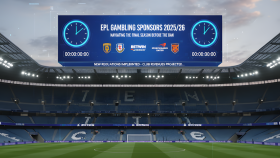EPL gambling sponsors 2025/26: Navigating the final season before the ban
Published: September 19, 2025
The English Premier League season 2025/26 will become one of the decisive and exclusive periods in the history of commercial collaborations within English football. With clubs and sponsors preparing to embark on another exciting season, this is because the future of kit sponsorships is characterized by one very important deadline: a self-imposed ban on front-of-shirt (FOS) gambling sponsorships, which is destined to come into force by the 2026/27 season. This imminent regulatory shift has left a transition phase, with clubs embarking on strategic (and in many cases short-term) decisions to maximize revenue before the ban comes.
The article explores the industry of the 2025/26 season, discussing what teams still include gambling brands on their kits, what the financial reasons behind such choices are, and what may happen long-term to the league. We will see the hidden conflict between the short-term interest of the club, which is monetary concerns, and the rising pressure of the government and society to reduce the negative impact of gambling, a dispute that is not yet exhausted.
The Regulatory Countdown: Understanding the Premier League's Self-Imposed Ban
To counter the ongoing practice of sponsoring front-of-matchday shirts, in 2023, all Premier League clubs agreed to a historic step: to have a voluntary ban on betting sponsorships. Although it is not a governmental directive, it was an initiative move to counter mounting public and political pressure regarding the high presence of gambling advertisements in football. The ban will take effect at the beginning of the 2026/27 season.
The limited scope of this agreement is a vital point. The prohibition will only cover the front of the shirt advertising space, and other, more profitable opportunities, such as shirt sleeves, training package, and in-stadium signs, will be available. This partial prohibition is a calculated concession by the Premier League whereby the body will focus on a major social issue whilst cushioning the financial jolt to its member clubs. This sends a strong message to the gambling firms to ensure that their advertising is done in these other, more visible assets after the FOS ban comes into effect.
This self-regulation, however, according to critics, is not sufficient, and more detailed bans already exist in countries such as Spain and Belgium. This is a continuous pressure that implies that the existing structure might not be the last word on the subject. As parliamentary groups keep introducing investigations over gambling regulation, there is a prospect of additional limitations, which will bring long-term uncertainty to both clubs and sponsors.
The Final Roster: EPL Clubs with Gambling Sponsors in 2025/26
Although the ban is looming over, there are still a great number of clubs that have gambling companies as their primary kit sponsors in 2025/26. Out of the 20 clubs in the league, 12 have had gambling sponsors put on the front of their shirts, and two clubs have this on their sleeves as well. The high figure highlights the economic significance of such partnerships.
Here are the confirmed clubs with a front-of-shirt gambling sponsor for the 2025/26 season:
- Aston Villa: Betano
- Bournemouth: bj88
- Brentford: Hollywoodbets
- Burnley: [suspicious link removed] (Newly promoted)
- Crystal Palace: Net88
- Everton: Stake.com
- Fulham: SBOTOP
- Leicester City: BC.GAME
- Southampton: Rollbit
- Sunderland: W88 (Newly promoted)
- West Ham United: BoyleSports
- Wolverhampton Wanderers: DEBET
The list points out one important fact: the two newly promoted clubs, Sunderland and Burnley, have both acquired FOS gambling sponsorships. To these teams, having a high-value sponsorship is an eye-opener to enhance their financial ability and compete favorably. In the case of Sunderland entering into a deal with W88, the club's record commercial deal is made clear, with the impending ban mentioned as a one-season deal. On the same note, the 12.5 million deal of West Ham to BoyleSports, a record contract, is another short-term contract. Such deals are a clear signal of a short-term, non-ethical financial approach to fill the financial void before the ban sets in.
Beyond the main shirt, two clubs also feature gambling companies on their sleeves for the 2025/26 season:
- Crystal Palace: Kaiyun Sports
- Leeds United: Parimatch
The occurrence of the newly-promoted Leeds United getting a gambling sleeve sponsor as a replacement for a non-gambling one is an indication that the club and gambling brands have shifted their strategy. With the limitation of FOS space, the price and demand of sleeve sponsorships will grow tremendously.
The Financial Imperative: Why Clubs Embrace Last-Gasp Deals
Continued dependence on gambling sponsorship, especially new promoted and mid-level clubs, is essentially a monetary problem. The gambling companies usually present a substantial source of income, and the deals are sometimes worth twice as much as a non-gambling option. This forms a strong financial motivation that, in most cases, overrides the brand implications that would have existed in the long term of being linked to a controversial industry.
The prospective ban has not scared away gambling companies; indeed, there has been an increasing number of FOS gambling sponsors in the season before the ban. This is a counterintuitive trend that shows that the two parties are likely to take advantage of this window of opportunity. Gambling companies will gladly pay a premium where one year of prime placement will be left, and clubs will gladly receive a huge but one-time increase in revenue.
Nevertheless, there is a long-term problem that goes with this short-term gain. The looming ban will cause a gap in sponsorship of clubs that will be affected. The value of shirt sponsorship of the Premier League may reduce by as much as 38 percent after the ban. It implies that the current clubs that have gambling sponsors will face a disadvantaged bargaining position in searching for new non-gambling sponsors in the year 2026/27, and they might be forced to accept lower values. This may increase the disparity in the finances between the elite in the league who already have an upper hand in terms of receiving higher non-gambling sponsorship value by global brands and the medium-sized clubs.
Navigating the Future: A Post-Ban Landscape
Starting in the 2026/27 season, the sponsorship scene in the Premier League will have very different appearances. The most noticeable type of gambling advertisement will no longer feature on the fronts of matchday shirts, but it is not likely that this will see the end of the industry in English football.
Gambling corporations have already changed their strategies. The narrowness of the ban implies that they will be able to redirect their attention to other high-profile assets. We will see a flood of gambling alliances around:
- Sleeve Sponsorships: This is the most apparent and immediate substitute, which can be observed with the new deal of Leeds United. And it is a very noticeable place on the kit that is not in the existing ban.
- Training Kit Sponsorships: This offers brand exposure throughout the year, both on training and in the media.
- In-stadium Advertising: Digital and physical hoardings with a high impact and on-screen promotions in televised matches are a powerful means to keep the brand visible.
In the case of clubs, the opportunity and threat is the diversification. They will be forced to find other commercial partners with a broader spectrum of industries, such as technology, financial services (a trend that has been witnessed in the La Liga in Spain after a similar ban), tourism, and consumer goods. This compelled diversification may be a desirable trend, and a more ethically sound business world will be created. Corporate Social Responsibility (CSR) is an issue that is gaining prominence on the agenda of brands, and a club that has a less-tainted sponsorship record can be more appealing to brands with a highly ethical reputation.
Finally, the front-of-shirt ban is a big move, but the transitional year 2025/26 season demonstrates that the issue of gambling sponsorship in football is by no means closed. How the league will maneuver through this tricky commercial and ethical landscape would be the defining factor of how well the league will survive monetarily and in the eyes of the overall public in the coming years.
Image Credit - Gemini
- ''Always appearing so angry and aggressive' - Caressa criticises Lookman's attitude
- 'I'm not a bad player' - Victor Boniface shares honest verdict on his Super Eagles form
- Thierry Mouyouma explains why he called up suspended player for WCQ playoff v Nigeria
- 'Unpredictable' - Gabon coach says he's working on strategy to contain Super Eagle star Osimhen
- 'They need to avoid Ivory Coast' - Salomon Kalou warns Nwabali on Super Eagles' Afcon chances
- Confirmed: Osimhen's hat-trick against Ajax Amsterdam costs Heitinga his job
- 2017 Super Eagles invitee beats Nwaneri to Arsenal's October Goal of the Month
- 'We always expect to win' - Nwabali backs Super Eagles to go one better at Afcon 2025
- Marcolino cousins, Oyono twins, Lemina brothers, Aubameyang named in Gabon squad to face Nigeria
- 'He's very old' - Osimhen impressed by Ajax's 41yo GK, opens up on playing with a mask
 Football News 24/7
Football News 24/7

- African Players
- Australia/ Asia
- Belgian Championship
- Bundesliga
- Danish Football
- English Premier League
- Non Gamstop Casinos
- Non Gamstop Casino sites
- UK Casinos not on Gamstop
- Nigeria National Teams
- Nigeria Premier League
- Norwegian Football
- bk8
- 789club
- iwin
- Football Betting
- Polish Football
- Russian Championship
- Serie A
- vt88
- Vt88
- Keo nha cai moi
- Spanish Liga
- Swedish Championship
- Transfer
- Turkish Championship
- 1Win
- Ukrainian Football
- Uncategorized
- Women's Football

